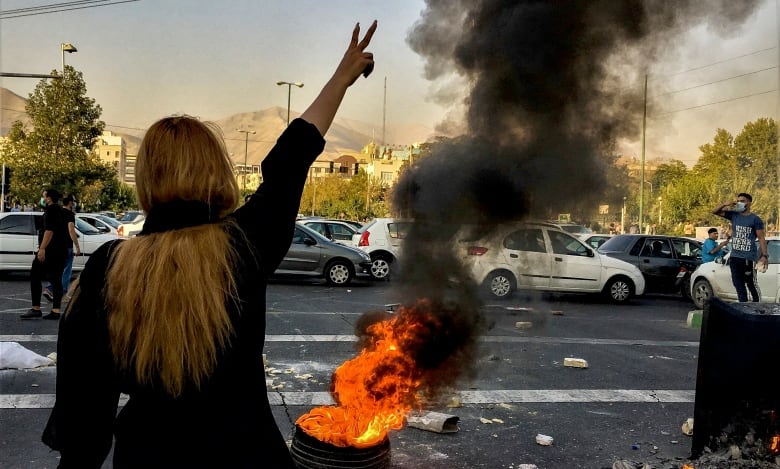Prominent Iranian rapper Toomaj freed on bail after over a year of arbitrary detention
Activists say keeping Toomaj imprisoned too much trouble for regime that loathes media attention

In the early hours of Saturday morning, Toomaj Salehi's family and friends gathered in front of Isfahan Central Prison in Iran, waiting to welcome him home.
It was not until close to midnight, when authorities secretly dropped the rapper off at an undisclosed location, that his inner circle realized they had been denied the warm reunion they had planned.
That's according to his closest confidante, Negin Niknaam, who is based in Germany
Toomaj (who is known by his first name) was detained for a year and 21 days, spending 252 days in solitary confinement, Niknaam says.
'They know how beloved he is'
The rapper was subjected to severe torture, a source close to the rapper told CBC News last year, and as outlined in a legal complaint Toomaj launched several weeks ago.
Toomaj sustained broken bones in several parts of his body, including his fingers, leg and ribs, his political sponsor Ye One-Rhie has said.
Niknaam confirms the rapper's release was in part secured by a large bail, the exact sum of which has not been disclosed to the public.
"The regime tried to torment him until the very last moment," Niknaam said. "They know how beloved he is and didn't want him to be embraced in a big way. They didn't want pictures of Toomaj in front of the prison spreading on social media."
Niknaam says his spirits are as good as can be, but underscored the urgent need for medical care that she says was unjustly denied throughout the past year.
In a social media post following his release, his only statement so far, Toomaj said the manner of his release was more bitter than the loneliness he felt under the tortures he endured in detention.
اولین چیزی که توماج گفت: فکر میکردم غمگینترین موقعیت یه آدم تنها بودن زیرِ شکنجههای زمان بازداشته، حالا میفهمم تنهایی آزاد شدن از اون هم تلختره.
—@OfficialToomajFor his songs and outspoken criticism of the regime in Iran, Toomaj gained the nickname "Lion of Iran" among compatriots and simultaneously became a target for authorities.
That was once again the case when the historic Women, Life, Freedom protests erupted in 2022 after the death of Mahsa Jina Amini in custody of the so-called morality police, as security forces arrested over 20,000 individuals and killed at least 500 protesters.
Toomaj was brutally abducted on Oct. 30 that year, among the first to be detained.
Release comes as regime scared of larger protests
Independent journalist Hedie Kimiaee says Iran has been caught in a recurring cycle of anti-regime protests since about 2017.
She argues that the timing of Toomaj's release strategically aligns with the regime's aim to dampen growing public discontent.
This month, Iranians mark the fourth anniversary of "Bloody November," or "Aban," when a regime crackdown killed 1,500 protesters – individuals whom Toomaj honoured in many of his songs.

Speaking from Istanbul, Kimiaee said: "Today, Iranians are mourning the many victims of past Novembers — lives claimed by the regime in both 2019 and 2022. Emotions are high. So, authorities are scared of a spark that could trigger larger protests that could ultimately lead to its downfall."
Niknaam says the regime is attempting to distract Iranians with the "good news" of Toomaj's release.
She also attributes the rapper's freedom to international pressure. Niknaam, who was entrusted by Toomaj to run his social media presence, says the rapper simply became too big of a headache for the regime behind prison walls.
Several media outlets have continuously covered the rapper's ordeals in prison since he was abducted.
"The regime really cares about its image and the way it's portrayed in Western media. They didn't like the continued attention on Toomaj," Niknaam said.
Kimiaee agrees: "They have already inflicted the maximum amount of pain and pressure on Toomaj possible. With all the international attention on his case, the regime would have paid a higher price by keeping him jailed."
'Freedom on bail is not real freedom'
Toomaj's release got a cautious response from his political sponsor Ye One-Rhie, who emphasized that charges against the artist are still pending.
The German politician, who has lobbied for the rapper's full freedom, said the bail release is a diversionary tactic by authorities to distract from their "unjust regime".
"Freedom on bail is not real freedom, not freedom without conditions," she wrote on X, formerly known as Twitter.
Toomaj has been released on bail!<br>I'm very happy about that, but we have to be cautious. Freedom on bail is not real freedom, not freedom without conditions. As long as the Islamic Republic does not drop all charges against him, we will not stop fighting for him. <a href="https://twitter.com/hashtag/ToomajSalehi?src=hash&ref_src=twsrc%5Etfw">#ToomajSalehi</a>
—@YeOne_RhieNiknaam said while the exact conditions of the bail are unknown, Toomaj will now face pressure and censorship from the regime's intelligence apparatus.
"He can be taken back to prison at any point," she said.
Kimiaee said it was difficult to predict Toomaj's future.
"I've never seen anyone like Toomaj. He courageously critiqued the regime and its lobbyists in the West when no one else dared. Anticipating his next move is tough."
Nonetheless, she points to the vital role of international media in naming those imprisoned by the Iranian regime, stating that such exposure can save lives, as evidenced in Toomaj's case.
"Toomaj has always been the voice of the oppressed in Iran. And, thousands of them — prisoners and human rights activists — remain in prison, with their names unknown to the world," she said.